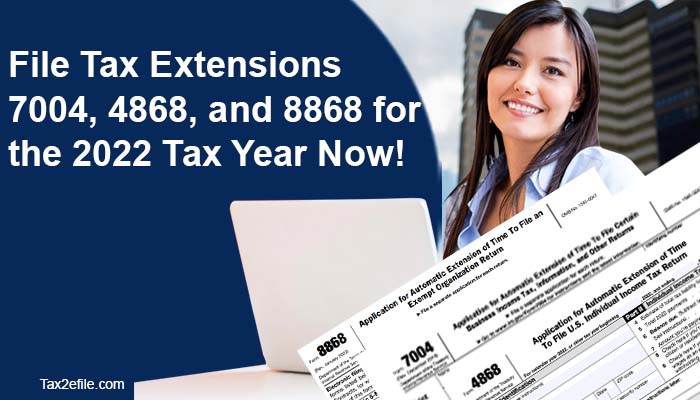- April 5, 2023

The IRS tax extension filing deadline is near and if you are worried about the tax deadline, it is time to consider filing an extension. Filing a personal tax extension is easy and simple and can be done online through e-filing portals. This helps in pushing the due date for filing tax returns by six months, to October 17th, 2022, irrespective of income. But the tax extension request should be filed by April 18th, which is the federal tax filing deadline.
Important things you should know, before filing a personal tax extension this year:
The tax season for the year 2022 has become complex, leaving more work for tax filers. There are a lot of things to consider such as reconciling the stimulus payments, concentrating on advance child tax credits, and making pandemic-relevant changes to the tax returns. Also, most taxpayers didn’t get Form 1099-B which covers profits and losses from the brokerage accounts, until early March. If you have not filed your taxes, you are not alone, and there is nothing to worry about as well. If you are worried about the April 18th deadline for tax filing, you can consider the tax extension.
How to file a tax extension:
Filing an extension is best to take time and prepare the returns in peace, rather than rushing to complete the Form and having to amend the 2021 returns later. If you are not ready with your tax Forms, by April 18th, you can file a tax extension for the federal income tax return statements. You can file this extension electronically by submitting Form 4868 with IRS-free File.
You can also move your tax filing deadline to October 17th, 2022, without using tax Form 4868 by making payments through the IRS Direct pay portal and using the dropdown menu to choose ‘extension’ as the reason for not filing the returns.
The extension covers only paperwork and not tax payments:
Filing a tax extension through Form 4868 gives time for preparing the paperwork only. The taxpayers should still pay their tax amount to the IRS before the deadline. It is better to estimate the taxes at the higher end and pay the extra amount with the IRS. Paying lesser than the tax due estimate will only end up in penalties and late fines. If you pay an additional amount, you can escape penalties and IRS will refund the excess tax amount within 21, when filed electronically.
What if I miss the tax deadline?
If you owe a tax refund, there is no penalty for filing the federal taxes late. But if you owe money to the IRS, your interests and penalties start to accrue on the remaining unpaid taxes after filing the deadline. The late filing penalty is 5% of the taxes due for each month, and the return is behind. The fees will increase to up to 25% of the due balance, after passing 60 days. The late payment penalty of the taxes due for each month of the return is 0.5%. These penalties can increase up to 25% of the unpaid tax.
Bottom-line:
Thus, to prevent such late fines and penalties, it is better to e-file or postmark the individual tax return through credible portals like tax2efile.
